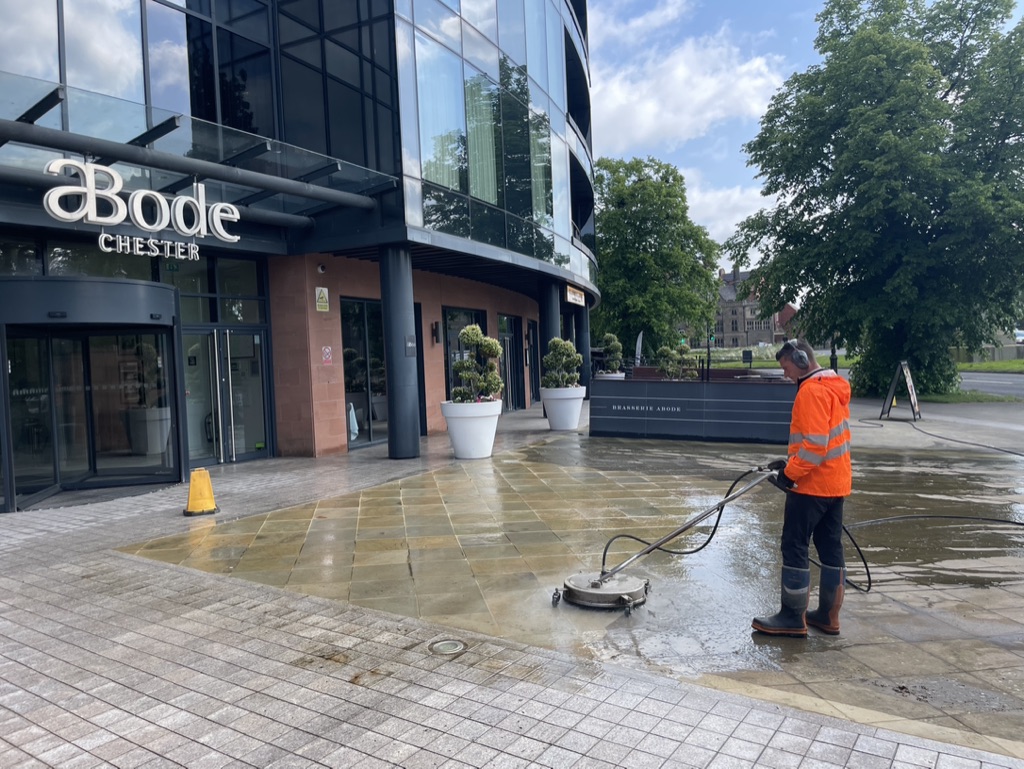Soft washing and pressure washing are two methods used to clean various exterior surfaces of buildings. While both these methods may seem similar, they have significant differences in terms of technique, application, and effectiveness. Understanding the differences between soft washing and pressure washing can help you make an informed decision when choosing the best method for your exterior building cleaning needs.
What is Pressure Washing?
Pressure washing is a cleaning technique that uses high-pressure water to remove dirt, grime, and stains from surfaces. This method is ideal for cleaning surfaces such as concrete, bricks, tiles, tarmac and other hard surfaces that can withstand high-pressure washing. The pressure can be adjusted to suit the surface being cleaned.
One of the main advantages of pressure washing is that it is fast and effective, the high-pressure water can remove stubborn stains and dirt from surfaces quickly. Pressure washing is best suited for tough outdoor cleaning jobs, such as removing dirt and grime from patios and driveways. It’s also a great way to clean large areas quickly and efficiently, making it a popular choice for commercial and industrial cleaning applications such as car parks and and forecourts.
While pressure washing is effective at removing stains, it can also be damaging to some surfaces. High-pressure water can cause damage to delicate surfaces such as roofs, render and painted surfaces. Additionally, pressure washing can also cause damage to grout, mortar, and other materials used in the construction of certain surfaces.
We have put together a blog which takes a more in-depth look at the benefits of pressure washing.
What is Soft Washing?
Soft washing is a cleaning technique that uses low-pressure water combined with specialised cleaning solutions to remove dirt, stains, and grime from delicate surfaces. This method is ideal for cleaning surfaces such as roofs, rendering, decking, and other surfaces that are vulnerable to damage from high-pressure washing.
Soft washing involves applying a specialised cleaning solution to the surface, which is left to soak for a short while. The solution is then rinsed off using low-pressure water, which removes the dirt and grime from the surface. This technique is effective in removing algae, mold, mildew, and other organic stains that may be growing on the surface.
One of the main advantages of soft washing is that it is safe for delicate surfaces, such as roof tiles and wood. The low-pressure water used in soft washing prevents damage to the surface, while the cleaning solution ensures that the surface is thoroughly cleaned. Soft washing can also be environmentally friendly as it can use biodegradable cleaning solutions that do not harm the environment.
Differences Between Soft Washing and Pressure Washing
Soft washing and pressure washing are two common techniques used for exterior cleaning. Although both techniques are effective, there are differences between them that make them suitable for different situations. Here are the key differences between soft washing and pressure washing:
Water Pressure: The most significant difference between soft washing and pressure washing is the amount of water pressure used. Pressure washing uses high-pressure water to blast away dirt and grime, while soft washing uses low-pressure water to clean surfaces gently.
Cleaning Solutions: Soft washing involves the use of specialised cleaning solutions, such as detergents, bleach, and other chemicals, to break down dirt and grime on the surface. Pressure washing doesn’t typically require the use of cleaning solutions, although they can be used in some cases.
Surface Damage: Pressure washing can cause damage to some surfaces, such as wood or older roofs. Soft washing is much gentler on surfaces and is less likely to cause damage, making it a better option for cleaning delicate surfaces.
Effectiveness: Both techniques are effective, but soft washing is generally considered more effective for removing dirt, grime, and stains from surfaces. Soft washing is also better at killing and removing mold, mildew, and algae.
Cost: Soft washing tends to be slightly more expensive than pressure washing due to the cost of the specialised cleaning solutions used in the process.
Should You Choose Soft Washing Or Pressure Washing?
If you’re looking to clean a delicate surface or remove mold, mildew, or algae, soft washing is the better option. If you’re looking to blast away dirt and grime quickly and don’t have any delicate surfaces, pressure washing may be the way to go. Ultimately, the best choice depends on the specific needs of your cleaning project.
Speak To Our Exterior Cleaning Experts
We offer both domestic pressure washing and commercial pressure washing services. Also, we offer a range of soft washing services for roof cleaning, render cleaning and patio cleaning to name a few. Our team of professional cleaners can advise you which is best suited for your cleaning job, you can email our team at [email protected] or you can call us today on 01745 289055.





